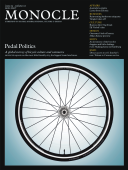
Issue 3
Pedal Politics: A global survey of bicycle culture and commerce. Monocle reports on the most bike-friendly city, the biggest brand and more.
In This Issue
Oops! No content was found.
Looks like we no longer have content for the page you're on. Perhaps try a search?
Return Home

